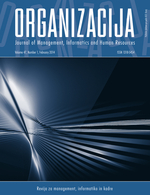Revising the Importance of Factors Pertaining to Student Satisfaction in Higher Education
Abstract
Background and purpose: Competition among higher education institutions is intensifying and such institutions are increasingly directing efforts towards improving their ranking. In this context, both high-quality programmes and student satisfaction have become major goals of universities. In our study, we tried to identify the importance of various factors influencing student satisfaction in higher education institutions.
Design/Methodology/Approach: A paper-and-pencil survey was carried out in the 2017/18 academic year at the University of Maribor in Slovenia. Students were verbally informed of the nature of the research and invited to freely participate. They were assured of anonymity. Mean values and standard deviations of the responses were calculated. Friedman test was conducted to assess which satisfaction factors were a priority for the students. Independent samples t-test was used to examine whether a significant difference exists between specific groups. The correlations between satisfaction factors and selected study variables (age, average grade and readiness to spread information) were tested using Pearson correlation coefficients.
Results: The study results revealed that the most important factors influencing student satisfaction were teaching staff, followed by administrative support, programme issues, physical environment, location of the institution, social life and support facilities. Significant differences between the genders were found for two satisfaction criteria, i.e. programme issues and administrative support, both being more important to women than men. We also found that the higher the level of the class, the lower was the importance of the satisfaction factors.
Conclusion: The results of this study indicate that higher education institutions need to focus efforts on improving the quality of teaching aspects so as to respond to the needs of their students, but also that they should not neglect non-teaching factors, especially regarding the physical environment. With improving these factors institutions can raise students’ satisfaction, gain on the reputation and impact future enrolment.
Keywords: student satisfaction; higher education; teaching staff; support facilities; programme issues
Design/Methodology/Approach: A paper-and-pencil survey was carried out in the 2017/18 academic year at the University of Maribor in Slovenia. Students were verbally informed of the nature of the research and invited to freely participate. They were assured of anonymity. Mean values and standard deviations of the responses were calculated. Friedman test was conducted to assess which satisfaction factors were a priority for the students. Independent samples t-test was used to examine whether a significant difference exists between specific groups. The correlations between satisfaction factors and selected study variables (age, average grade and readiness to spread information) were tested using Pearson correlation coefficients.
Results: The study results revealed that the most important factors influencing student satisfaction were teaching staff, followed by administrative support, programme issues, physical environment, location of the institution, social life and support facilities. Significant differences between the genders were found for two satisfaction criteria, i.e. programme issues and administrative support, both being more important to women than men. We also found that the higher the level of the class, the lower was the importance of the satisfaction factors.
Conclusion: The results of this study indicate that higher education institutions need to focus efforts on improving the quality of teaching aspects so as to respond to the needs of their students, but also that they should not neglect non-teaching factors, especially regarding the physical environment. With improving these factors institutions can raise students’ satisfaction, gain on the reputation and impact future enrolment.
Keywords: student satisfaction; higher education; teaching staff; support facilities; programme issues
Refbacks
- There are currently no refbacks.

